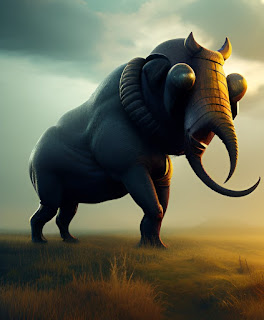Mastodon: Fossil or Future?
The richest man[1] on earth bought the most influential social media platform. The richest man on Earth told millions of Twitter users to vote Republican. The richest man on earth proclaimed the reign of absolute freedom, then closed down accounts that parodied him. The richest man on earth sacked half his staff.[2] There are many reasons to dislike Elon Musk’s public persona and his actions. There are many more reasons to leave Muskworld.
It’s not clear to me whether Musk bought Twitter as an investment, as a propaganda unit, or a plaything. Perhaps he really does believe he can rescue it through innovation. However, the fear that content moderation and authentication were being jettisoned has sparked fears of a racist, misogynistic, fascistic free-for-all. The highly-principled and often nomadic members of the Wokerati began to experiment with rumoured alternatives, such as Mastodon, and were suddenly aware of something radical called The Fediverse. Although the free Mastodon software dates back to 2016, the exponential growth in micro-blogging accounts has been most evident in recent weeks. Currently, there are almost 7 million Mastodon Accounts, increasing at the rate of 60K daily, 660K weekly.[3]
New users are attracted to the pleasant community feel of this relatively new, open-source, advert-free social media platform. Many dissidents and social media critics are now discovering that there is a revolutionary alternative to Muskworld. Rather than relying on advert-greedy corporations or billionaire-led patronage, Mastodon is an anarchic, decentralized federation of servers (instances), largely financed through volunteer effort and individual donations. Gone is the Twitter algorithm that selectively promoted tweets and exploited your data for corporate gain. On Mastodon, capitalism has been muzzled.
What’s most remarkable is the nostalgic sense of a return to the early days of the internet, when people would tell you that advertising was not allowed. Remember the time when the network was dominated by co-operation, collaboration, and a public service ethos, rather than narcissism, self-promotion, and corporate exploitation? In particular, new users of Mastodon are encouraged to mark posts that are potentially distressing, divisive or controversial with a Content Warning (CW). New users are encouraged to mark photos with ALT text to make them more accessible. New users are encouraged altruistically to boost significant posts of value, rather than boosting personal follower counts and their own ego-driven exhibitionism. It feels like the glory days of old internet 1.0. Or the faint glimmering dawn of a new age?
However, the arrival of so many newcomers has not been without tension. Established “natives” have complained about new arrivals bringing with them their bad Twitter habits: seeking celebrity, failing to observe the local lore and customs of polite and civilized behaviour. Are there any lessons to be drawn from imperialism and colonial ideology? On a technical level, many small-scale servers were suddenly overwhelmed by the burden of millions of new arrivals and dramatically increased traffic. Moreover, some of the newbies rudely complained that the user’s experience was worse than Twitter, stating that they were alienated by arcane terminology and the outlandish site navigation. Did they forget that new software/technology requires a bit of effort? The mythology of Mastodon’s difficulty has been widely promoted, especially by those who dislike change. For many, the Mastodon migration has been nothing more than a temporary protest, or more pragmatically, an insurance policy against the demise of Twitter, perhaps even its bankruptcy.
Having escaped the dark trauma of Muskworld, many enlightened Mastodonites were delighted to discover old and new friends. They began to notice the absence of adverts; they began to notice that the cult of celebrity was gone; they began to notice that the new culture was supportive rather than antagonistic, co-operative rather than competitive.
Are we witnessing the unleashing of human creativity? How long will the euphoria last? We need to keep a sense of proportion. Mastodon’s 7 million account make it a mere minnow compared with Twitter’s 486 million or Facebook’s 2,936 million.[4] With social media users now spending 2.5 hours on screen we need to care about the quality and diversity of those experiences which are now shaping global consciousness. Let’s hope that Mastodon is a contribution to global health and sanity, rather than the latest and last fossil of the Anthropocene era.
Further Information
How it all works: https://fedi.tips/
Copy Tweets to Mastodon: https://moa.party/
Find Twitter followers who have joined Mastodon: https://www.wired.com/story/how-to-find-twitter-friends-on-mastodon/
List of Mastodon Servers: https://joinmastodon.org/servers
My invitation to join Mastodon: https://ieji.de/invite/hbTi4RuB
My Mastodon Handle: @postfilm@ieji.de
My Twitter Handle: @postfilm
Notes
[1] "Bloomberg Billionaires Index". Bloomberg L.P. https://www.bloomberg.com/billionaires/profiles/elon-r-musk/ Retrieved 13 November 2022. "Real Time Billionaires". Forbes. https://www.forbes.com/real-time-billionaires/#175b89a93d78 Retrieved 13 November 2022.
[2] “Twitter slashes nearly half its workforce as Musk admits ‘massive drop’ in revenue.” https://www.theguardian.com/technology/2022/nov/04/twitter-layoffs-elon-musk-revenue-drop Retrieved 13 November 2022.
[3] Current statistical updates are available “User Count Bot for all known Mastodon instances” from @mastodonusercount@bitcoinhackers.org.
[4] Dave Chaffey, “Global social media statistics research summary 2022.” 22 Aug 2022. https://www.smartinsights.com/social-media-marketing/social-media-strategy/new-global-social-media-research/ Retrieved 13 November 2022.




Comments
Post a Comment
My blog posts are exploratory rather than finished works. You are invited to add any comments below...